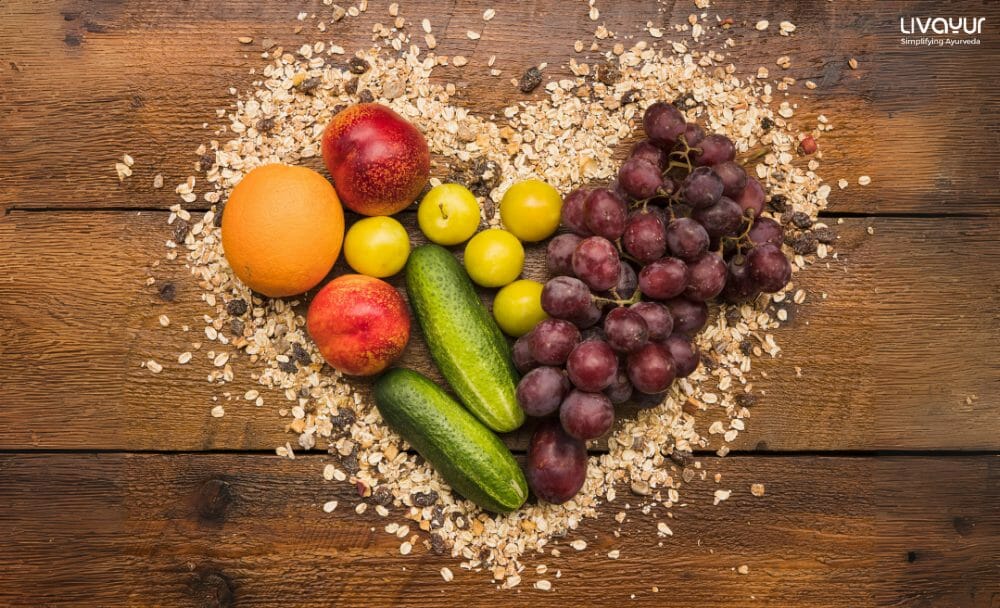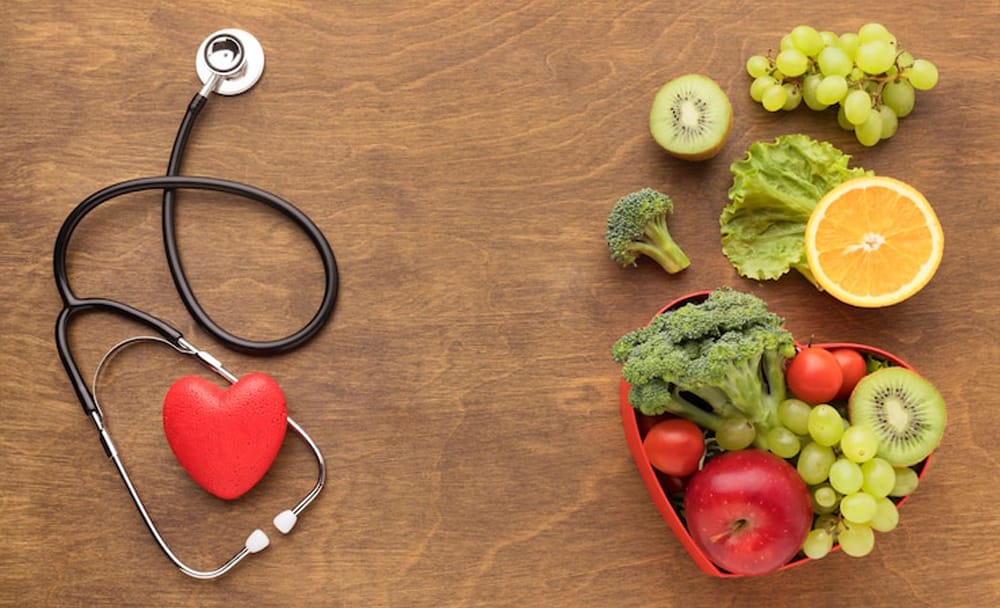
The heart is one of the most vital organs of the body. Its health can impact the overall health of your body and mind. However, during winters, your heart may get adversely affected. The cold can make blood vessels contract, consequently increasing the risk of high blood pressure levels, heart attacks and stroke. Therefore, protecting your heart and improving your heart health is crucial during winters.
Ayurveda For Heart Health
According to Ayurveda, the heart is a primary seat of Vata, Pitta, Kapha and Ojas in the body. It is intimately connected to the Heart Chakra and is crucial for the balance of the body, mind and spirit. Ayurveda mentions many dietary regulations, lifestyle recommendations and herbal remedies to boost heart health.
Aahar or Diet Tips for Heart Health

- Eat a balanced diet full of fresh fruits and vegetables such as ridge gourd, bottle gourd, ivy gourd, snake gourd, pumpkin, leafy vegetables, etc.
- Include protein-rich foods such as lentils, millet, rice, barley, etc., in your diet.
- Avoid foods that are hard to digest and increase bad cholesterol in the body, such as red meat.
- Limit the intake of foods high in sodium, such as pickles, and foods high in sugar, such as cakes and pastries.
- Reduce the consumption of wheat and fermentation-increasing foods such as yoghurt and cheese.
- Limit the consumption of alcohol.
- Avoid sour foods such as tomatoes, oranges, lemons, vinegar, etc.
- Include ghee in your diet. Ghee is beneficial for your heart. It is rich in omega-3 fatty acids, antioxidants and conjugated linolenic acid (CLA) that help prevent many heart diseases.
Vihar or Lifestyle Tips for Heart Health

- Remain physically active throughout the day. Do not lead a sedentary lifestyle.
- Go for a daily walk for 30 minutes to improve heart functions and reduce cholesterol levels.
- Stress can elevate the risk of heart problems. Therefore, reduce stress and avoid negative thoughts.
- Practice Yoga every day. It helps relieve stress, increase blood circulation and improve the functioning of the heart. The best Yoga Asanas for heart health are Surya Namaskar (Sun Salutation), Salabhasana (Locust Pose), Setu Bandha Sarvangasana (Bridge Pose), Gomukhasana (Cow Face Pose), Dhanurasana (Bow Pose), Pashchimottanasana (Seated Forward Bend Pose), Vrikshasana (Tree Pose) and Savasana (Corpse Pose).
- Also, practice Pranayama and meditation every day. They help to calm the mind, reduce stress and support heart health.
Herbal Remedies for Heart Health
- Arjun Ki Chaal (White Marudah):
Arjuna is considered one of the best herbs for heart health in Ayurveda. It is known to strengthen the circulatory system, improve the functioning of heart muscles, maintain the levels of healthy cholesterol and control blood pressure levels in the body.
To use Arjuna, take one cup of water and add half a teaspoon of Arjun ki Chaal. Let it boil for 10-15 minutes until it is reduced to half. Then, pour it into a cup and drink it. Alternatively, you can also take Arjuna powder in the recommended quantity with warm water.
- Lehsun (Garlic):
Lehsun is another highly recommended herb for the heart. It helps to prevent cell damage, reduce plaque buildup in the arteries, lower blood pressure levels and regulate cholesterol levels in the body.
To use garlic, boil a cup of milk and add a clove of crushed garlic with a pinch of cinnamon. Let it simmer for 5-7 minutes. Then, turn off the heat and let the mixture cool down. Next, add honey to the milk and drink it in the morning. Alternatively, you can also eat garlic directly in the morning.
- Gold Water:
Gold is known to heal and strengthen the heart in Ayurveda. To reap the benefits of gold, you can drink water infused with the energy of gold.
To make gold water, place any gold item in 2 cups of water. Let it boil until the water is reduced to half. Then, remove the gold item and let the water cool down. Store the water in a jar and take one teaspoon of this water 2-3 times a day.
- Tulsi (Holy Basil):
Tulsi contains Eugenol, an antioxidant that helps control blood pressure levels and lower cholesterol levels in the body.
To use Tulsi, simply chew a few leaves every day on an empty stomach.
- Adrak (Ginger):
Adrak (Ginger) helps to boost blood circulation, improve digestive fire and remove harmful toxins from the body. Therefore, it is considered one of the best herbs for heart health.
To use ginger, you can mix ½ teaspoon of ginger juice in lukewarm water and drink it twice a day. You may also add ½ teaspoon of garlic juice to this water for added benefits. Alternatively, you can also make ginger tea by boiling fresh ginger in water for 5-10 minutes.
- Haldi (Turmeric):
Haldi (Turmeric) is rich in curcumin, an antioxidant that helps improve endothelial functions of the heart. Additionally, turmeric also regulates blood clotting, controls blood pressure levels, reduces inflammation and prevents the accumulation of toxins in the arteries.
You can add turmeric to a wide range of foods. Alternatively, you can also drink turmeric milk to reap the benefits of the herb.
The Takeaway
The heart is a critically important organ of the body. Therefore, it is essential to maintain heart health, especially during winters, as the cold increases the risk of cardiovascular diseases.
According to Ayurveda, the health of any organ depends on self-care, which includes proper nutrition, appropriate exercise, stress management and adequate sleep. Hence, follow a heart-friendly lifestyle and boost your heart health with the above-mentioned Ayurvedic tips.

















